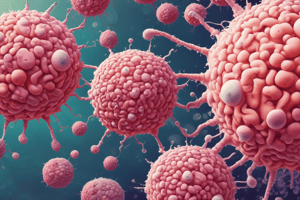Podcast
Questions and Answers
What is microbiology?
What is microbiology?
The study of microorganisms.
All microorganisms can be seen with the naked eye.
All microorganisms can be seen with the naked eye.
False (B)
What does 'micro' mean?
What does 'micro' mean?
Small
What is parasitology?
What is parasitology?
Which of the following is a method of pasteurization?
Which of the following is a method of pasteurization?
Match the following scientists with their contributions:
Match the following scientists with their contributions:
Koch's postulates state that microorganisms can be isolated and grown in pure culture.
Koch's postulates state that microorganisms can be isolated and grown in pure culture.
The process of converting sugar to simpler substances is known as ______.
The process of converting sugar to simpler substances is known as ______.
Which of the following terms refers to a single type of organism?
Which of the following terms refers to a single type of organism?
What is Tyndallization?
What is Tyndallization?
Maggots can develop in a jar of meat that is covered.
Maggots can develop in a jar of meat that is covered.
What is the significance of Robert Koch's discovery of Bacillus anthracis?
What is the significance of Robert Koch's discovery of Bacillus anthracis?
What is the main concept of spontaneous generation?
What is the main concept of spontaneous generation?
Flashcards are hidden until you start studying
Study Notes
Microbiology Basics
- Microbiology studies diverse microorganisms, including bacteria, viruses, and fungi.
- Microorganisms can exist as single cells or clusters; they are generally microscopic and require a microscope for observation.
- "Micro" implies invisibility to the naked eye.
Parasitology Overview
- Parasitology is the study of parasites, most of which can be seen, while some require microscopy.
- Parasites necessitate direct contact with the host for nutrient acquisition. Not all parasites are worms.
Public Health Goals
- Public health focuses on three primary aims:
- Preventive disease strategies
- Promotion of health
- Prolongation of life through community efforts
Pasteurization Methods
- Low-temp hold pasteurization: 63°C for 30 minutes.
- High-temp short time (HTST): 72°C for 15 seconds.
- Ultra-high temperature (UHT): 140°C for 4 seconds.
- Anaerobic processes involve no oxygen.
Tyndallization
- Tyndallization is an intermittent sterilization process, also known as fractional sterilization.
Golden Age of Microbiology
- Benjamin Martin published "A New Theory of Consumption," contributing to early microbiology.
Robert Koch's Contributions
- Discovered Bacillus anthracis, the first microorganism to satisfy Koch’s Postulates.
- Identified Mycobacterium tuberculosis as a significant pathogen.
- Koch's Postulates outline criteria for linking microorganisms to diseases:
- A healthy person should not possess the microorganism.
- Microorganisms from a disease-affected person should be isolated and cultivated in pure culture.
- Inoculation of a healthy person with the microorganism should result in disease.
- The microorganism must be re-isolated from the experimentally infected host.
Exceptions to Koch's Postulates
- Normal flora are bacteria that reside in the body and typically do not cause disease unless displaced.
- Common normal flora locations:
- Mouth
- Colon (largest population)
- Skin (e.g., Staphylococcus epidermidis)
- Nose (e.g., Staphylococcus aureus)
Key Historical Figures
- Robert Hooke: Discovered cells, termed "little boxes," and established early cell theory; known as the father of cytology.
- Anton Van Leeuwenhoek: The first to observe live microorganisms, called "animalcules," and is recognized as the father of microbiology.
Spontaneous Generation Debate
- Spontaneous generation theory proposed that living organisms arise from non-living matter.
- Key figures:
- Francesco Redi: Demonstrated through experiments that spontaneous generation was false (e.g., maggots from meat in jar experiments).
- John Needham: Supported spontaneous generation with broth experiments.
- Lazzaro Spallanzani: Findings reinforced Redi's conclusions by showing that sealed broth jars do not develop life.
Studying That Suits You
Use AI to generate personalized quizzes and flashcards to suit your learning preferences.




